(完整版)现在完成时态阅读文章
- 格式:doc
- 大小:57.51 KB
- 文档页数:3
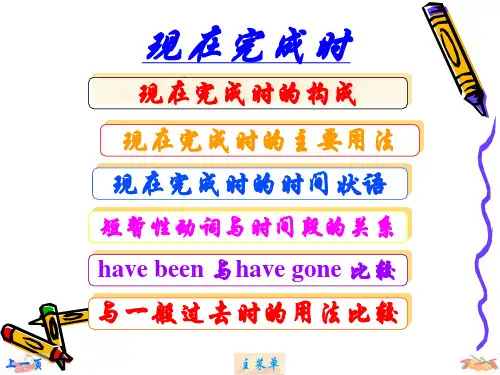
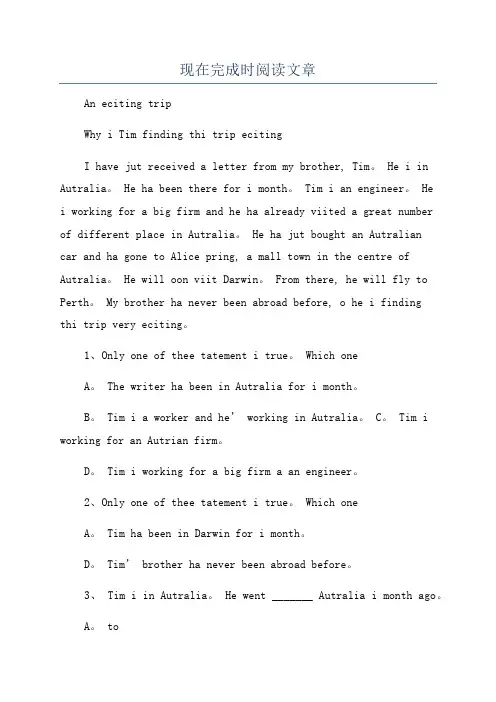
现在完成时阅读文章An eciting tripWhy i Tim finding thi trip ecitingI have jut received a letter from my brother, Tim。
He i in Autralia。
He ha been there for i month。
Tim i an engineer。
He i working for a big firm and he ha already viited a great number of different place in Autralia。
He ha jut bought an Autraliancar and ha gone to Alice pring, a mall town in the centre of Autralia。
He will oon viit Darwin。
From there, he will fly to Perth。
My brother ha never been abroad before, o he i findingthi trip very eciting。
1、Only one of thee tatement i true。
Which oneA。
The writer ha been in Autralia for i month。
B。
Tim i a worker and he’ working in Autralia。
C。
Tim i working for an Autrian firm。
D。
Tim i working for a big firm a an engineer。
2、Only one of thee tatement i true。
Which oneA。
Tim ha been in Darwin for i month。
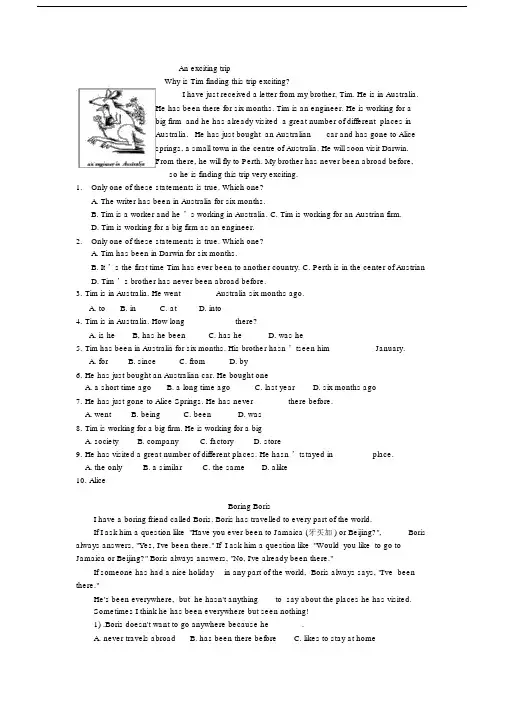
An exciting tripWhy is Tim finding this trip exciting?I have just received a letter from my brother, Tim. He is in Australia.He has been there for six months. Tim is an engineer. He is working for abig firm and he has already visited a great number of different places inAustralia. He has just bought an Australian car and has gone to Alicesprings, a small town in the centre of Australia. He will soon visit Darwin.From there, he will fly to Perth. My brother has never been abroad before,so he is finding this trip very exciting.1.Only one of these statements is true. Which one?A.The writer has been in Australia for six months.B.Tim is a worker and he ’s working in Australia.C. Tim is working for an Austrian firm.D.Tim is working for a big firm as an engineer.2.Only one of these statements is true. Which one?A.Tim has been in Darwin for six months.B.It ’s the first time Tim has ever been to another country.C. Perth is in the center of AustrianD.Tim ’s brother has never been abroad before.3.Tim is in Australia. He went _______ Australia six months ago.A. toB. inC. atD. into4. Tim is in Australia. How long ___________there?A. is he B, has he been C. has he D. was he5. Tim has been in Australia for six months. His brother hasn ’tseen him __________January.A. forB. sinceC. fromD. by6. He has just bought an Australian car. He bought one________A. a short time agoB. a long time agoC. last yearD. six months ago7. He has just gone to Alice Springs. He has never _______ there before.A. wentB. beingC. beenD. was8. Tim is working for a big firm. He is working for a big___________A. societyB. companyC. factoryD. store9. He has visited a great number of different places. He hasn ’tstayed in ________ place.A. the onlyB. a similarC. the sameD. alike10. AliceBoring BorisI have a boring friend called Boris. Boris has travelled to every part of the world.If I ask him a question like "Have you ever been to Jamaica (牙买加 ) or Beijing?",Boris always answers, "Yes, I've been there." If I ask him a question like "Would you like to go to Jamaica or Beijing?" Boris always answers, "No, I've already been there."If someone has had a nice holiday in any part of the world, Boris always says, "I've been there."He's been everywhere, but he hasn't anything to say about the places he has visited.Sometimes I think he has been everywhere but seen nothing!1) .Boris doesn't want to go anywhere because he _______.A. never travels abroadB. has been there beforeC. likes to stay at home2) Where has Boris been?A. He has only been to Jamaica.B. He has only been to Beijing.C. He has been to many different places.3)If someone has had a nice holiday abroad, you can be sure that Boris _______.A. wants to go thereB. will go there soonC. has already been there4) The writer's friend Boris is boring because _______.A. he always talks about the places he has visited.B. he has nothing to say about theplaces he has visited. C. he is always travelling.No wrong numbersWhat does 'No wrong numbers' mean?Mr.James Scott has a garage in Silbury and now he has just boughtanother garage in Pinhurst. Pinhurst is only five miles from Silbury, but Mr.Scott cannot get a telephone for his new garage, so he has just boughttwelve pigeons. Yesterday, a pigeon carried the first message from Pinhurstto Silbury. The bird covered the distance in three minutes. Up to now,Mr.Scott has sent a great many requests for spare parts and other urgent messages from one garage to the other. In this way, he has begun his ownprivate 'telephone' service.生词和短语 : pigeon n. 鸽子cover v. 越过distance n. 距离request n. 要求,请求spare part 备件 service n. 业务,服务难点 1: In the way : Please move this chair. It is in the way .Do you work in the way I have shown you.On the way : On the way to the station, I bought some chocolate.In this way : He saves old envelopes. In this way , he has collected a great many stamps.By the way : By the way, have you seen Harry recently.In a way : In a way , it is an important book.练习: 1. __________ from Athens to London, the plane stopped at Rome.2. I cooked this________ you showed me.3. ____________. Where is my coat?4. Yes, ________ he has been very successful.5. Children get ________ during the holidays. 难点 2: Spare: I cannot spare the time. 我花不起时间。
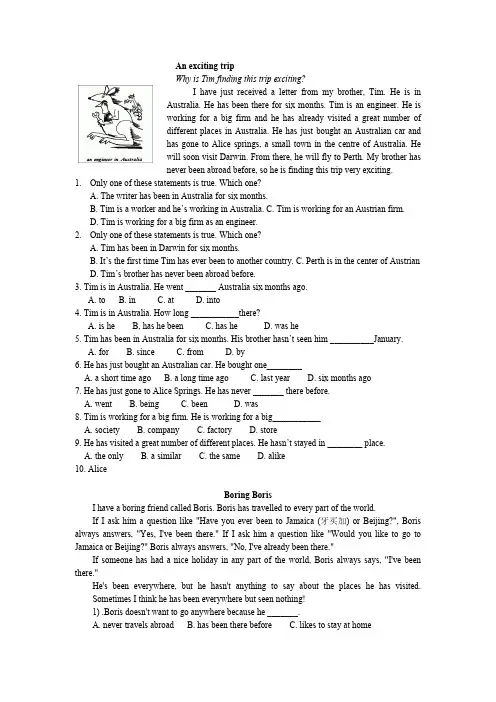
An exciting trip Why is Tim finding this trip exciting? I have just received a letter from my brother, Tim. He is in Australia. He has been there for six months. Tim is an engineer. He is working for a big firm and he has already visited a great number of different places in Australia. He has just bought an Australian car and has gone to Alice springs, a small town in the centre of Australia. He will soon visit Darwin. From there, he will fly to Perth. My brother has never been abroad before, so he is finding this trip very exciting.1.Only one of these statements is true. Which one?A. The writer has been in Australia for six months. B. Tim is a worker and he’s working in Australia. C. Tim is working for an Austrian firm. D. Tim is working for a big firm as an engineer.2.Only one of these statements is true. Which one?A. Tim has been in Darwin for six months. B. It’s the first time Tim has ever been to another country. C. Perth is in the center of Austrian D. Tim’s brother has never been abroad before.3. Tim is in Australia. He went _______ Australia six months ago. A. to B. in C. at D. into 4. Tim is in Australia. How long ___________there? A. is he B, has he been C. has he D. was he 5. Tim has been in Australia for six months. His brother hasn’t seen him __________January. A. for B. since C. from D. by 6. He has just bought an Australian car. He bought one________A. a short time ago B. a long time ago C. last year D. six months ago 7. He has just gone to Alice Springs. He has never _______ there before.A. went B. being C. been D. was 8. Tim is working for a big firm. He is working for a big___________A. society B. company C. factory D. store 9. He has visited a great number of different places. He hasn’t stayed in ________ place.A. the only B. a similar C. the same D. alike 10. Alice Boring Boris I have a boring friend called Boris. Boris has travelled to every part of the world.If I ask him a question like "Have you ever been to Jamaica (牙买加) or Beijing?", Boris always answers, "Yes, I've been there." If I ask him a question like "Would you like to go to Jamaica or Beijing?" Boris always answers, "No, I've already been there." If someone has had a nice holiday in any part of the world, Boris always says, "I've been there." He's been everywhere, but he hasn't anything to say about the places he has visited. Sometimes I think he has been everywhere but seen nothing!1) .Boris doesn't want to go anywhere because he _______.A. never travels abroad B. has been there beforeC. likes to stay at home2) Where has Boris been?A. He has only been to Jamaica.B. He has only been to Beijing.C. He has been to many different places.3)If someone has had a nice holiday abroad, you can be sure that Boris _______.A. wants to go thereB. will go there soonC. has already been there4) The writer's friend Boris is boring because _______.A. he always talks about the places he has visited.B. he has nothing to say about theplaces he has visited. C. he is always travelling.No wrong numbersWhat does 'No wrong numbers' mean?Mr.James Scott has a garage in Silbury and now he has just bought another garage in Pinhurst. Pinhurst is only five miles from Silbury, butMr. Scott cannot get a telephone for his new garage, so he has just boughttwelve pigeons. Yesterday, a pigeon carried the first message fromPinhurst to Silbury. The bird covered the distance in three minutes. Up tonow, Mr.Scott has sent a great many requests for spare parts and otherurgent messages from one garage to the other. In this way, he has begunhis own private 'telephone' service.生词和短语: pigeon n. 鸽子cover v. 越过distance n. 距离request n. 要求,请求spare part 备件service n. 业务,服务难点1:In the way: Please move this chair. It is in the way.Do you work in the way I have shown you.On the way: On the way to the station, I bought some chocolate.In this way: He saves old envelopes. In this way, he has collected a great many stamps.By the way: By the way, have you seen Harry recently.In a way: In a way, it is an important book.练习:1. __________ from Athens to London, the plane stopped at Rome.2. I cooked this________ you showed me.3. ____________. Where is my coat?4. Yes, ________ he has been very successful.5. Children get ________ during the holidays.难点2:Spare: I cannot spare the time. 我花不起时间。
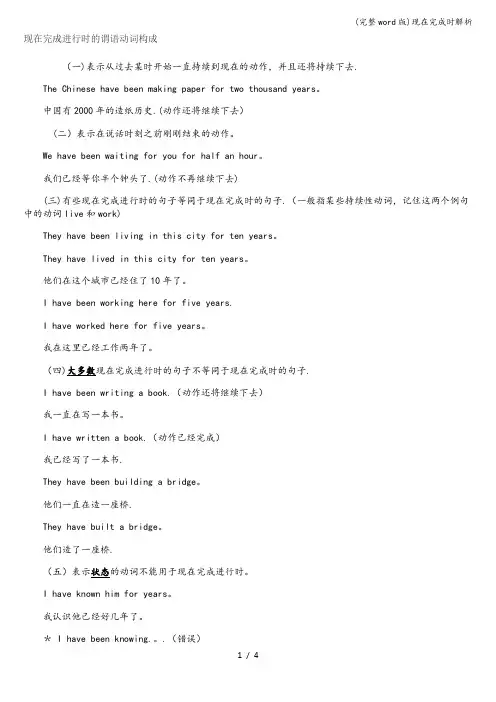
现在完成进行时的谓语动词构成(一)表示从过去某时开始一直持续到现在的动作,并且还将持续下去.The Chinese have been making paper for two thousand years。
中国有2000年的造纸历史.(动作还将继续下去)(二)表示在说话时刻之前刚刚结束的动作。
We have been waiting for you for half an hour。
我们已经等你半个钟头了.(动作不再继续下去)(三)有些现在完成进行时的句子等同于现在完成时的句子.(一般指某些持续性动词,记住这两个例句中的动词live和work)They have been living in this city for ten years。
They have lived in this city for ten years。
他们在这个城市已经住了10年了。
I have been working here for five years.I have worked here for five years。
我在这里已经工作两年了。
(四)大多数现在完成进行时的句子不等同于现在完成时的句子.I have been writing a book.(动作还将继续下去)我一直在写一本书。
I have written a book.(动作已经完成)我已经写了一本书.They have been building a bridge。
他们一直在造一座桥.They have built a bridge。
他们造了一座桥.(五)表示状态的动词不能用于现在完成进行时。
I have known him for years。
我认识他已经好几年了。
* I have been knowing.。
.(错误)这类不能用于现在完成进行时的动词还有:love爱,like喜欢,hate讨厌,等。
比较过去时与现在完成时1)过去时表示过去某时发生的动作或单纯叙述过去的事情,强调动作;现在完成时为过去发生的,强调过去的事情对现在的影响,强调的是影响.2)过去时常与具体的时间状语连用,而现在完成时通常与模糊的时间状语连用,或无时间状语。
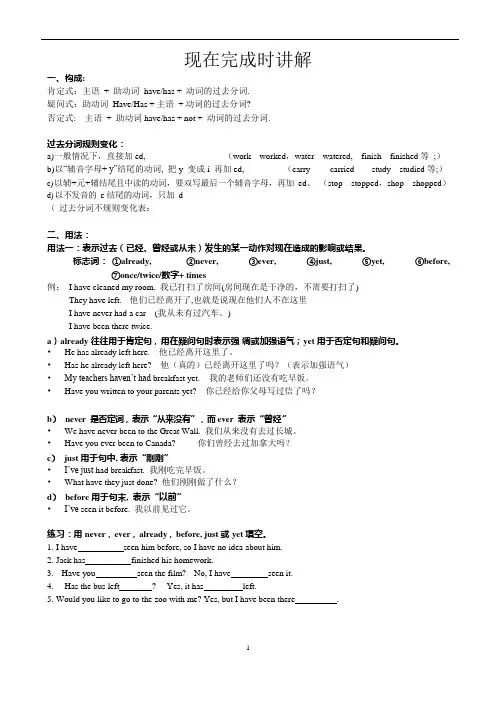
现在完成时讲解一、构成:肯定式:主语+ 助动词have/has + 动词的过去分词.疑问式:助动词Have/Has + 主语+ 动词的过去分词?否定式: 主语+ 助动词have/has + not + 动词的过去分词.过去分词规则变化:a)一般情况下,直接加ed, (work---worked,water---watered, finish---finished 等;)b)以“辅音字母+ y”结尾的动词, 把y 变成i 再加ed, (carry-- -carried study---studied 等;)c)以辅+元+辅结尾且中读的动词,要双写最后一个辅音字母,再加ed。
(stop---stopped,shop---shopped)d)以不发音的e 结尾的动词,只加d(过去分词不规则变化表:二、用法:用法一:表示过去(已经、曾经或从未)发生的某一动作对现在造成的影响或结果。
标志词:①already, ②never, ③ever, ④just, ⑤yet, ⑥before,⑦once/twice/数字+ times例:I have cleaned my room. 我已打扫了房间(房间现在是干净的,不需要打扫了)They have left. --他们已经离开了,也就是说现在他们人不在这里I have never had a car (我从未有过汽车。
)I have been there twice.a)already 往往用于肯定句,用在疑问句时表示强调或加强语气;yet 用于否定句和疑问句。
•He has already left here. 他已经离开这里了。
•Has he already left here? 他(真的)已经离开这里了吗?(表示加强语气)•My teachers haven’t had breakfast yet. 我的老师们还没有吃早饭。
•Have you written to your parents yet? 你已经给你父母写过信了吗?b)never 是否定词,表示“从来没有”,而ever 表示“曾经”•We have never been to the Great Wall. 我们从来没有去过长城。
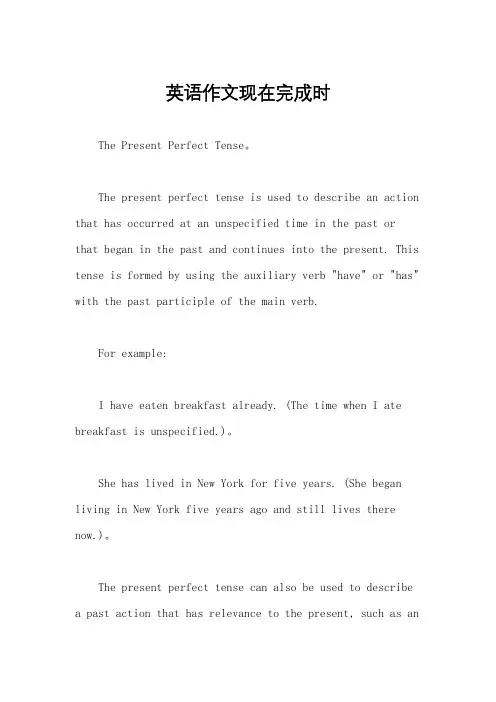
英语作文现在完成时The Present Perfect Tense。
The present perfect tense is used to describe an action that has occurred at an unspecified time in the past orthat began in the past and continues into the present. This tense is formed by using the auxiliary verb "have" or "has" with the past participle of the main verb.For example:I have eaten breakfast already. (The time when I ate breakfast is unspecified.)。
She has lived in New York for five years. (She began living in New York five years ago and still lives there now.)。
The present perfect tense can also be used to describe a past action that has relevance to the present, such as anaction that has just been completed or one that has a continuing effect.For example:I have just finished my homework. (The action of finishing my homework has just been completed.)。
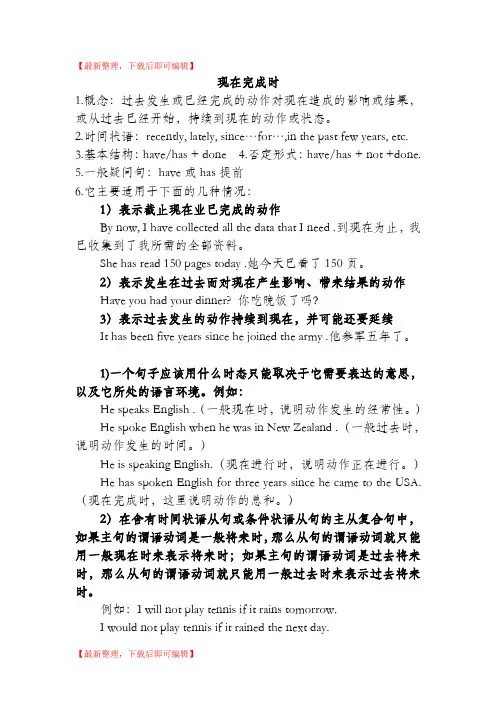
【最新整理,下载后即可编辑】现在完成时1.概念:过去发生或已经完成的动作对现在造成的影响或结果,或从过去已经开始,持续到现在的动作或状态。
2.时间状语:recently, lately, since…for…,in the past few years, etc.3.基本结构:have/has + done4.否定形式:have/has + not +done.5.一般疑问句:have或has提前6.它主要适用于下面的几种情况:1)表示截止现在业已完成的动作By now, I have collected all the data that I need .到现在为止,我已收集到了我所需的全部资料。
She has read 150 pages today .她今天已看了150页。
2)表示发生在过去而对现在产生影响、带来结果的动作Have you had your dinner? 你吃晚饭了吗?3)表示过去发生的动作持续到现在,并可能还要延续It has been five years since he joined the army .他参军五年了。
1)一个句子应该用什么时态只能取决于它需要表达的意思,以及它所处的语言环境。
例如:He speaks English .(一般现在时,说明动作发生的经常性。
)He spoke English when he was in New Zealand .(一般过去时,说明动作发生的时间。
)He is speaking English.(现在进行时,说明动作正在进行。
)He has spoken English for three years since he came to the USA.(现在完成时,这里说明动作的总和。
)2)在含有时间状语从句或条件状语从句的主从复合句中,如果主句的谓语动词是一般将来时,那么从句的谓语动词就只能用一般现在时来表示将来时;如果主句的谓语动词是过去将来时,那么从句的谓语动词就只能用一般过去时来表示过去将来时。
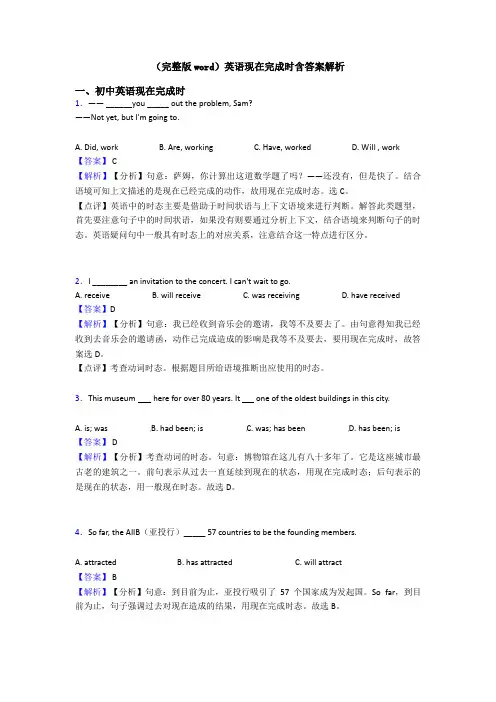
(完整版word)英语现在完成时含答案解析一、初中英语现在完成时1.—— ______you _____ out the problem, Sam?——Not yet, but I'm going to.A. Did, workB. Are, workingC. Have, workedD. Will , work【答案】 C【解析】【分析】句意:萨姆,你计算出这道数学题了吗?——还没有,但是快了。
结合语境可知上文描述的是现在已经完成的动作,故用现在完成时态。
选C。
【点评】英语中的时态主要是借助于时间状语与上下文语境来进行判断。
解答此类题型,首先要注意句子中的时间状语,如果没有则要通过分析上下文,结合语境来判断句子的时态。
英语疑问句中一般具有时态上的对应关系,注意结合这一特点进行区分。
2.I ________ an invitation to the concert. I can't wait to go.A. receiveB. will receiveC. was receivingD. have received【答案】D【解析】【分析】句意:我已经收到音乐会的邀请,我等不及要去了。
由句意得知我已经收到去音乐会的邀请函,动作已完成造成的影响是我等不及要去,要用现在完成时,故答案选D。
【点评】考查动词时态。
根据题目所给语境推断出应使用的时态。
3.This museum here for over 80 years. It one of the oldest buildings in this city.A. is; wasB. had been; isC. was; has beenD. has been; is【答案】 D【解析】【分析】考查动词的时态。
句意:博物馆在这儿有八十多年了。
它是这座城市最古老的建筑之一。
前句表示从过去一直延续到现在的状态,用现在完成时态;后句表示的是现在的状态,用一般现在时态。
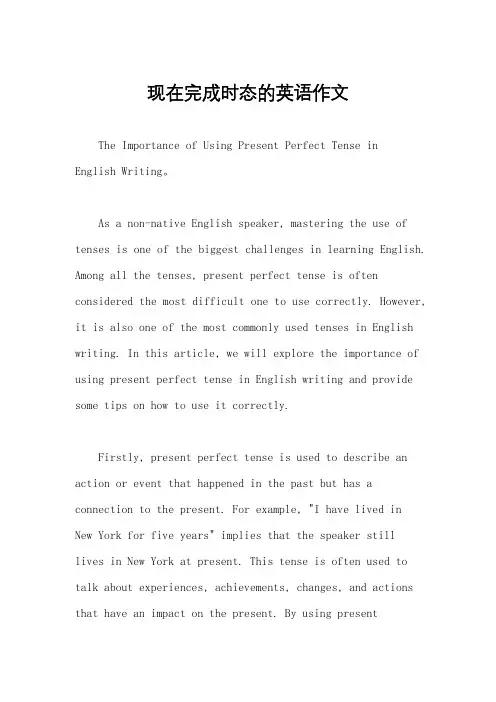
现在完成时态的英语作文The Importance of Using Present Perfect Tense inEnglish Writing。
As a non-native English speaker, mastering the use of tenses is one of the biggest challenges in learning English. Among all the tenses, present perfect tense is often considered the most difficult one to use correctly. However, it is also one of the most commonly used tenses in English writing. In this article, we will explore the importance of using present perfect tense in English writing and provide some tips on how to use it correctly.Firstly, present perfect tense is used to describe an action or event that happened in the past but has a connection to the present. For example, "I have lived in New York for five years" implies that the speaker stilllives in New York at present. This tense is often used to talk about experiences, achievements, changes, and actions that have an impact on the present. By using presentperfect tense, the writer can provide more context and depth to the story or description.Secondly, present perfect tense is used to describe an action or event that happened at an unspecified time in the past. For example, "She has visited Paris" does not specify when the visit occurred, but it implies that the person has been to Paris at some point in the past. This tense is often used to talk about general experiences or events that are not tied to a specific time. By using present perfect tense, the writer can convey a sense of timelessness and universality.Thirdly, present perfect tense is used to describe an action or event that started in the past and continues up to the present. For example, "I have been learning English for three years" implies that the person is still learning English at present. This tense is often used to talk about ongoing processes or habits that started in the past and have a connection to the present. By using present perfect tense, the writer can emphasize the duration and continuity of the action or event.However, using present perfect tense correctly can be tricky, especially for non-native English speakers. Here are some tips on how to use present perfect tense correctly in English writing:1. Use "have" or "has" as the auxiliary verb, depending on the subject (I/you/we/they use "have", he/she/it uses "has").2. Use the past participle form of the main verb (e.g. "lived", "visited", "learned", etc.).3. Use "for" to indicate the duration of the action or event (e.g. "I have lived in New York for five years").4. Use "since" to indicate the starting point of the action or event (e.g. "I have been learning English since 2018").5. Avoid using present perfect tense for actions or events that have a specific time reference in the past (usepast simple tense instead).In conclusion, present perfect tense is an important tense in English writing that can provide more context, depth, and universality to the story or description. By understanding its usage and following the tips provided, non-native English speakers can improve their writing skills and communicate more effectively in English.。
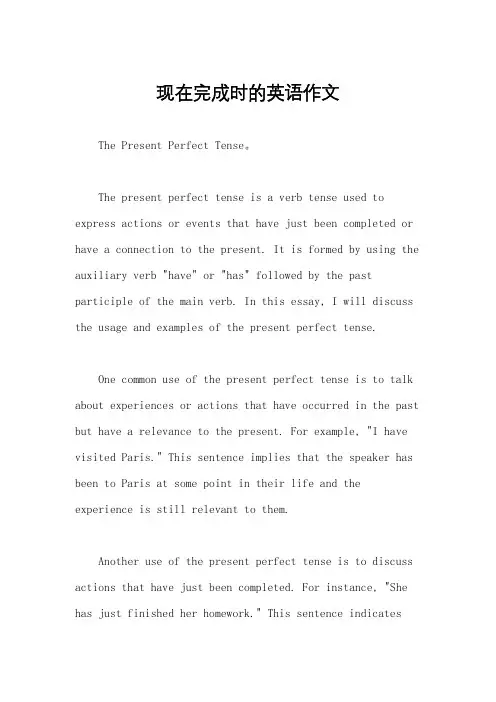
现在完成时的英语作文The Present Perfect Tense。
The present perfect tense is a verb tense used to express actions or events that have just been completed or have a connection to the present. It is formed by using the auxiliary verb "have" or "has" followed by the past participle of the main verb. In this essay, I will discuss the usage and examples of the present perfect tense.One common use of the present perfect tense is to talk about experiences or actions that have occurred in the past but have a relevance to the present. For example, "I have visited Paris." This sentence implies that the speaker has been to Paris at some point in their life and the experience is still relevant to them.Another use of the present perfect tense is to discuss actions that have just been completed. For instance, "She has just finished her homework." This sentence indicatesthat the person has completed their homework recently.The present perfect tense is also used to talk about actions that started in the past and continue up to the present. For example, "I have lived in this city for five years." This sentence suggests that the person has been living in the city for the past five years and is still living there.Furthermore, the present perfect tense is used to express actions that have occurred at an indefinite time in the past. For instance, "They have seen that movie before." This sentence implies that the people have seen the movie at some point in the past, but the exact time is not specified.The present perfect tense can also be used to discuss actions that have happened multiple times in the past. For example, "I have read that book three times." This sentence suggests that the person has read the book on three separate occasions.In addition to these uses, the present perfect tense is often used with time expressions such as "already," "yet," and "just." For instance, "I have already eaten dinner." This sentence indicates that the person has eaten dinner before the present moment.Overall, the present perfect tense is a versatile verb tense that is used to express various actions and events. Whether it is talking about past experiences, recent completions, ongoing actions, indefinite past actions, multiple occurrences, or using time expressions, the present perfect tense allows us to convey a wide range of information. By understanding and using this tense correctly, we can communicate effectively in English.。
现在完成时英语作文The Present Perfect Tense in English Writing。
The present perfect tense is a crucial aspect of English grammar that is used to indicate actions or events that have taken place at an unspecified time in the past or have relevance to the present moment. In this article, we will explore the various uses of the present perfect tense in English writing and provide examples to illustrate its correct usage.One of the primary uses of the present perfect tense is to describe an action or event that occurred at an unspecified time in the past. For example, "I have visited Paris" indicates that the action of visiting Paris has taken place at some point in the past, but the specific time is not mentioned. This use of the present perfect tense is often used when the time of the action is not important or not known.Another important use of the present perfect tense is to describe an action or event that has relevance to the present moment. For example, "I have lived in New York for five years" indicates that the action of living in New York has occurred in the past and has continued up to the present moment. This use of the present perfect tense is often used when the action or event has a connection to the present or is still ongoing.Furthermore, the present perfect tense is also used to describe an action or event that has just been completed. For example, "I have just finished my homework" indicates that the action of finishing homework has been completed very recently. This use of the present perfect tense is often used when the action has immediate relevance to the present moment.In addition, the present perfect tense is commonly used with time expressions such as "already," "yet," "just," and "recently." For example, "I have already eaten breakfast" and "Have you finished your work yet?" These time expressions help to convey the specific timing orcompletion of an action or event in relation to the present moment.It is important to note that the present perfect tense is formed by using the auxiliary verb "have" or "has" followed by the past participle of the main verb. For example, "I have studied" and "She has traveled." The use of "have" or "has" depends on the subject of the sentence, with "have" being used with first person (I, we) and second person (you) subjects, and "has" being used with third person (he, she, it) subjects.In conclusion, the present perfect tense is a versatile aspect of English grammar that is used to indicate actions or events that have taken place at an unspecified time in the past or have relevance to the present moment. By understanding its various uses and practicing its correct usage, English learners can improve their writing skills and effectively communicate in the present perfect tense.。
现在完成时英语作文The Importance of Learning English。
English is one of the most widely spoken languages in the world. It is the official language of over 50 countries and is spoken by around 1.5 billion people worldwide. Learning English is important for many reasons, including the following:1. Better job opportunities: Many companies require employees who can speak English, especially ininternational business. Knowing English can open up job opportunities and increase earning potential.2. Improved communication: English is the language of international communication. Knowing English can help people communicate with others from different countries and cultures.3. Access to information: Most of the information onthe internet is in English. Knowing English can help people access information and resources that are not available in their native language.4. Travel: English is the language of tourism. Knowing English can help people communicate with locals and navigate their way around foreign countries.5. Education: Many universities and colleges around the world teach in English. Knowing English can help people access higher education and study abroad opportunities.Despite the importance of learning English, many people struggle with it. Here are some tips for learning English:1. Practice regularly: Learning a language requires consistent practice. Set aside time each day to study and practice English.2. Immerse yourself: Surround yourself with English by listening to English music, watching English movies, and speaking with English speakers.3. Take classes: Enroll in an English class or hire a tutor to help you learn.4. Use technology: There are many apps and websitesthat can help you learn English, such as Duolingo and Rosetta Stone.5. Be patient: Learning a language takes time andeffort. Don't get discouraged if you don't see progressright away.In conclusion, learning English is important for many reasons, including better job opportunities, improved communication, access to information, travel, and education. By practicing regularly, immersing yourself in the language, taking classes, using technology, and being patient, youcan improve your English skills and reap the benefits that come with it.。
关于现在完成时态的英语作⽂ 现在完成时表⽰过去发⽣的动作对现在造成的影响。
英语作⽂中使⽤这些句型是可以给作⽂加分的。
那么关于现在完成时的英语作⽂有哪些呢?下⾯是店铺为⼤家精⼼挑选的关于现在完成时的英语作⽂,希望对⼤家有所帮助。
现在完成时的英语作⽂篇⼀ It is a sunny day.We deciding to have a picnic outside the city. In the morning,we taking an early bus to Nanhui. It is quite a colorful world.There are green trees,orange leaves,red peach blossoms. At noon,we reaching the place,we sitting by the river bank and taking out a lot of things,such as bread,orange juice,apples,cakes,eggs and so on. But all of a sudden,it begining to rain.Unluckily there is no shelter nearby. We taking a bus to go back home in a hurry.What a pity! 现在完成时的英语作⽂篇⼆ Have you ever been to Wuhan?I have been there several times. I think it's really a beautiful city. I fell in love with it when I first traveled there.It has many nice places. The traffic is fine.And the people are friendly. There are some beautiful parks such as the Zhongshan Park,the East Lake Park and the Liberation Park. In the zoo,you can see many kinds of animals. You can easily buy what you want,because there are supermarkets everywhere.You can see tall buildings up and down the streets. And the streets are wide and tidy. Trees can be seen everywhere.Buses and taxis can take you where you want to go.The drivers are polite.You will feel comfortable. There is an airport in Wuhan.You can fly to the foreign countries and take air trips freely. Please travel to Wuhan.I would like to be your tour guide. 现在完成时的英语作⽂篇三 I’ve been to the beach for many times. Each time i went there, I have many different feelings. One day I went there with my parents, we looked at the ocean together. We ran on the beach, swam in the ocean. We really had fun. When I went there with my firends, we played water polo in the ocean together. We played happily. Our friendship became very good. The ocean is really beautiful, I like swimming in the ocean. When I look at the ocean in nights. I have different feelings. I feel the world is really beautiful. I like the blue ocean. I will put my best memory on it.。
现在完成时用法英语文章PresentPerfectEnglishClub Present PerfectThe Present Perfect tense is a rather important tense in English, but it gives speakers of some languages a difficult time. That is because it uses concepts or ideas that do not exist in those languages. In fact, the structure of the Present Perfect is very simple. The problems come with the use of the tense. In addition, there are some differences in usage between British and American English.In this lesson we look at the structure and use of the Present Perfect tense, as well as the use of for and since, followed by a quiz to check your understanding.The Present Perfect tense is really a very interesting tense, and a very useful one. Try not to translate the Present Perfect into your language. Just try to accept the concepts of this tense and learn to "think" Present Perfect! You will soon learn to like the Present Perfect tense!How do we make the Present Perfect tense?The structure of the Present Perfect is:subject + auxiliary have+ main verbconjugated in Present Simplehave, has past participleThe auxiliary verb (have) is conjugated in the Present Simple: have, hasThe main verb is invariable in past participle form: -ed (or irregular)For negative sentences we insert not between the auxiliary verb and the main verb.For question sentences, we exchange the subject and the auxiliary verb.Look at these example sentences with the Present Perfect tense:subject auxiliary verb main verb + I have seen ET. + You have eaten mine. - She has not been to Rome. - We have not played football. Have you finished?Havetheydoneit?Contraction with Present PerfectWhen we use the Present Perfect in speaking, we often contract the subject and auxiliary verb. We also sometimes do this in informal writing.I have I've You haveYou'veHe has She has It has John has The car has He's She's It's John's The car's We haveWe'veThey have They've• You've told me that before. • John's seen Harry Potter .In negative sentences, we may contract the auxiliary verb and "not":• You haven't got a chance. • She hasn't heard from him.He's or he's Be careful! The 's contraction is used for the auxiliary verbs have and be . For example, "It's eaten" can mean:• It has eaten. (Present Perfect tense, active voice)• It is eaten. (Present Simple tense, passive voice)It is usually clear from the context. How do we use the Present Perfect tense?This tense is called the Present Perfect tense. There is always a connection with the past and with the present .We use the Present Perfect to talk about:• experience • change• continuing situationPresent Perfect for experienceWe often use the Present Perfect to talk about experience from the past. We are not interested in when you did something. We only want to know if you did it:I have seen an alien. He has lived in Bangkok. Have you been there?We have never eaten caviar. past presentfutureThe action or state was in the past. In my head, I have amemory now.Connection with past: the event was in the pastConnection with present: in my head, now , I have a memory of the event; I know something about the event; I have experience of itPresent Perfect for changeWe also use the Present Perfect to talk about a change , or new information:I have bought a car. pastpresentfuture- + Last week I didn't havea car.Now I have a car.John has broken his leg. past present future +-Yesterday John had agood leg.Now he has a bad leg.Has the price gone up ? past present future +-Was the price $1.50 yesterday? Is the price $1.70today?The police have arrested the killer. past present future -+Yesterday the killerwas free.Now he is in prison.Connection with past: the past is the opposite of the presentConnection with present: the present is the opposite of the pastAmericans do use the Present Perfect but less than British speakers. Americans often use the Past Simple tense instead. An American might say "Did you have lunch?", where a British person would say "Have you had lunch?" Present Perfect for continuing situationWe often use the Present Perfect to talk about a continuing situation . This is a state that started in the past and continues in the present (and will probably continue into the future). This is a situation (not an action). We usually use for or since with this structure.I have worked here since June.He has been ill for 2 days.How long have you known Tara (for)? past present futureThe situation startedin the past.It continues up to now. (It will probablycontinue into thefuture.)Connection with past: the situation started in the past. Connection with present: the situation continues in the present.For and Since with Present Perfect tenseWe often use for and since with perfect tenses:• We use for to talk about a period of time: five minutes, twoweeks, six years• We use since to talk about a point in past time: 9 o'clock,1st January, Mondayforsincea period of time a point in past time - - - - - - - - - - - - - · - - - - - - - - - -20 minutes 6.15pm three days Monday 6 months January 4 years 1994 2 centuries 1800a long time I left schoolever the beginning of time etcetcLook at these example sentences using for and since with the Present Perfect tense:• I have been here for twenty minutes. • I have been here since 9 o'clock. • John hasn't called for six months. • John hasn't called since February.•He has worked in New York for a long time.•He has worked in New York since he left school.For can be used with all tenses. Since is usually used with perfect tenses only.Present Perfect QuizBack to 12 English TensesPresent Perfect GamesHome: Learn English : Grammar : Verbs : Tense : Tenses: Present Perfect。
作文范文之现在完成时作文现在完成时作文【篇一:2014春新版八年级英语下册作文范文】unit1 what’s the matter?今天刘英生病了,不能去上学,她的妈妈带她到人民医院(the people’s hospital)去看病。
请你根据下面的提示,写一篇60词左右的短文,要求把医生的建议写清楚。
可用一般现在时态进行叙述。
提示:1、看医生2、检查(look over)3、多喝水4、吃药5、卧床休息提示信息:have a fever, see a doctor, look over, take some medicine, drink water, liedown and rest, feel well, go home.范文欣赏:liu ying can’t go to school today because she is ill. so her mother takes her to thepeople’s hospita l. the doctor looks her o ver carefully. at last the doctor says toher ,“you have had a fever. you should take some medicine and drink more water. youshould also lie down and rest, so you shouldn’t go to school for several days. i’ m sureyou’ll feel better soon.” liu ying and her mother thank the doctor and go home.unit2 i’ll help to clean up the city parks.爱是心中的太阳,融化你我身边的冰雪。
假设你是李明,你们学校正在举办主题为“付出即是收获”(giving is receiving)的征文活动,请你结合自己平时的爱心行为和感受写一篇文章。
An exciting tripWhy is Tim finding this trip exciting?I have just received a letter from my brother, Tim. He is in Australia.He has been there for six months. Tim is an engineer. He is working for abig firm and he has already visited a great number of different places inAustralia. He has just bought an Australian car and has gone to Alicesprings, a small town in the centre of Australia. He will soon visit Darwin.From there, he will fly to Perth. My brother has never been abroad before,so he is finding this trip very exciting.1.Only one of these statements is true. Which one?A. The writer has been in Australia for six months.B. Tim is a worker and he’s working in Australia.C. Tim is working for an Austrian firm.D. Tim is working for a big firm as an engineer.2.Only one of these statements is true. Which one?A. Tim has been in Darwin for six months.B. It’s the first time Tim has ever been to another country.C. Perth is in the center of AustrianD. Tim’s brother has never been abroad before.3. Tim is in Australia. He went _______ Australia six months ago.A. toB. inC. atD. into4. Tim is in Australia. How long ___________there?A. is he B, has he been C. has he D. was he5. Tim has been in Australia for six months. His brother hasn’t seen him __________January.A. forB. sinceC. fromD. by6. He has just bought an Australian car. He bought one________A. a short time agoB. a long time agoC. last yearD. six months ago7. He has just gone to Alice Springs. He has never _______ there before.A. wentB. beingC. beenD. was8. Tim is working for a big firm. He is working for a big___________A. societyB. companyC. factoryD. store9. He has visited a great number of different places. He hasn’t stayed in ________ place.A. the onlyB. a similarC. the sameD. alike10. AliceBoring BorisI have a boring friend called Boris. Boris has travelled to every part of the world.If I ask him a question like "Have you ever been to Jamaica (牙买加) or Beijing?", Boris always answers, "Yes, I've been there." If I ask him a question like "Would you like to go to Jamaica or Beijing?" Boris always answers, "No, I've already been there."If someone has had a nice holiday in any part of the world, Boris always says, "I've been there."He's been everywhere, but he hasn't anything to say about the places he has visited.Sometimes I think he has been everywhere but seen nothing!1) .Boris doesn't want to go anywhere because he _______.A. never travels abroadB. has been there beforeC. likes to stay at home2) Where has Boris been?A. He has only been to Jamaica.B. He has only been to Beijing.C. He has been to many different places.3)If someone has had a nice holiday abroad, you can be sure that Boris _______.A. wants to go thereB. will go there soonC. has already been there4) The writer's friend Boris is boring because _______.A. he always talks about the places he has visited.B. he has nothing to say about theplaces he has visited. C. he is always travelling.No wrong numbersWhat does 'No wrong numbers' mean?Mr.James Scott has a garage in Silbury and now he has just bought another garage in Pinhurst. Pinhurst is only five miles from Silbury, but Mr.Scott cannot get a telephone for his new garage, so he has just boughttwelve pigeons. Yesterday, a pigeon carried the first message from Pinhurstto Silbury. The bird covered the distance in three minutes. Up to now,Mr.Scott has sent a great many requests for spare parts and other urgentmessages from one garage to the other. In this way, he has begun his ownprivate 'telephone' service.生词和短语: pigeon n. 鸽子cover v. 越过distance n. 距离request n. 要求,请求spare part 备件service n. 业务,服务难点1:In the way: Please move this chair. It is in the way.Do you work in the way I have shown you.On the way: On the way to the station, I bought some chocolate.In this way: He saves old envelopes. In this way, he has collected a great many stamps.By the way: By the way, have you seen Harry recently.In a way: In a way, it is an important book.练习:1. __________ from Athens to London, the plane stopped at Rome.2. I cooked this________ you showed me.3. ____________. Where is my coat?4. Yes, ________ he has been very successful.5. Children get ________ during the holidays. 难点2:Spare: I cannot spare the time. 我花不起时间。
I have no time to spare.我没有时间。
I cannot buy spare parts for this car.我买不起这辆车的备件。